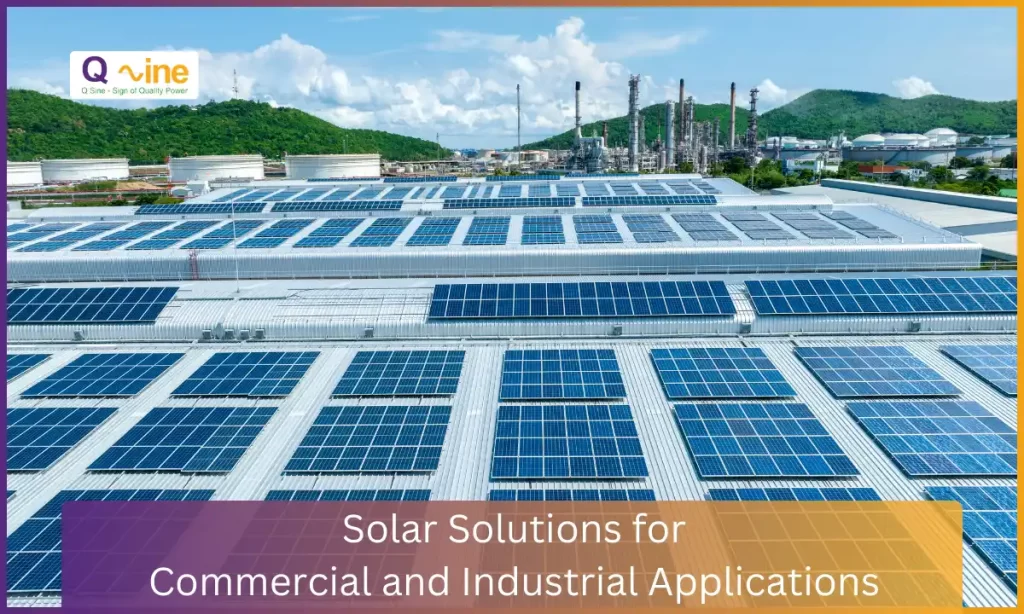In the past years, solar solutions have gained broad interest from a commercial and industrial viewpoint due to their affordability, eco-friendliness, and energy efficiency.
When the world is gradually moving towards renewable sources of energy, solar energy has become the option for businesses aimed at reducing their carbon footprint and saving energy costs.
There is a solid commercial and industrial case for solar energy. These sectors are the most significant drivers of global energy use and greenhouse gas emissions.
As such, businesses will lessen their dependence on fossil fuel energies characterized by high energy bills through solar solutions and thus show commitment to sustainability. Besides, the solar solution increases the value of a property and competitiveness in marketplaces.
Understanding solar solutions is critical for any business to get an overview of some investment opportunities for realizing solar energy. Solar solutions harness and channel sunlight onto solar panels to provide usable energy.
They can be categorized into three major classes: photovoltaic, solar thermal, and concentrated solar power systems. Each has different pros and cons; therefore, businesses must know their energy requirements and budgets accordingly before settling on a specific solar solution.
The Case for Solar Energy in Commercial and Industrial Sectors
Environmental Benefits

Solar energy is a clean, renewable resource that does not emit harmful emissions, making this resource an ideal solution for businesses trying to reduce their carbon footprint. Solar solutions for commercial and industrial spaces will help drastically reduce greenhouse gas emissions that jeopardize the climate. Furthermore, there are no requirements for water to be used in running solar energy systemsᅳsomething very important in water-scarce areas.
Economic Advantages
Significant economic benefits exist for businesses that use solar energy. Companies depend less on the grid to develop electricity and do not bear electricity price increases.
Solar solutions for commercial and industrial space solve issues related to reliability. Added to this are tax incentives and rebates during installation, which help reduce the initial investment of the business owner.
This financial prudence and security make solar solutions a smart investment for any business.
Energy Independence
From environmental to economic and independence in energy supply, the list of benefits that the commercial and industrial space solar solutions confess to is long.
This shall be how businesses reduce their carbon footprint, cut electricity expenditure, and provide reliable energy for operations with these solar energy systems.
The long-term benefits of these solutions should reassure business owners of their decision and instill confidence in their sustainability and cost-effectiveness.
Understanding Solar Solutions
Solar energy is being used commercially and industrially because it is inexpensive and environmentally friendly. Knowing how different solar panels work, their functioning, power generation, and the components that makeup systems are relevant for decision-making in any solar solution implementation.
Types of Solar Panels
Several types of solar panels are available in the market, each with unique features and benefits. The most common types of solar panels are:
- Monocrystalline solar panels are fabricated from one silicon crystal, making them very efficient and perfect for space-constrained commercial and industrial uses.
- Polycrystalline solar panels are made from several silicon crystals. Compared to monocrystalline, they are relatively inefficient but pocket-friendly.
- Thin-film solar panels are lightweight and flexible, perfect for curved surfaces and portable applications.
Solar Power Generation
Solar power generation is creating electricity from sunlight using solar panels. Several steps are followed,
- absorption of sunlight by solar panels
- Sunlight onto the solar panels is then converted into DC electricity.
- An inverter is used to invert such electricity into AC electricity. It is, therefore, distributed into the electrical grid or a storage system.
System Components and Functionality
The solar system requires many components, all of which are essential tasks. Such components include:
- Solar panels are the system’s central parts that collect light from the sun and then convert it into electricity.
- Inverter: This device converts the DC electricity generated by solar panels into electricity used in AC or sent to the grid.
- Battery storage: The part that stores the excess electrical energy produced by the solar panels for later use without sunlight, applicable for Off grid solar systems.
- Monitoring system: This part monitors the operation and allows one to see the issues in the solar system.
Every business and industry must understand the different types of solar panels, the generation of solar power, and the components and functionality of the system to implement practical solutions for commercial and industrial purposes.
This informed decision will help each business to capture benefits in terms of cost savings, sustainability, and the environment.
Solar Solutions for Commercial Spaces
Commercial spaces—offices, retail stores, and warehouses—typically have high energy demands. This is how solar solutions can reduce electricity bills and provide a continuous source of energy.
Essential Parameters in Applying Solar Solutions in Commercial Spaces.
Assessment and Planning
A professional assessment will need to be done before installing solar panels in a commercial space to assess its energy needs and the type of solar solution to be installed.
The size of the commercial space, amount of energy consumed, and accessible roof or ground space need to be observed. After such an assessment, professionals can then decide on the most effective, cost-friendly way to respond.
Installation and Integration
Solar panels can be installed after an assessment has been finalized. Roof-mount solar panels are a favourite in commercial spaces.
Ground-mounted applications can also be offered, provided that there is adequate space. This will include mounting the panels, connecting them to the electrical system, and testing. It advises hiring a professional installer who can ensure proper and safe installation of your panels.
The other need is to integrate it into the commercial space’s electrical system. The last step involves installing an inverter, which one uses to convert DC power harnessed from solar to AC power that can be used in the business shop. An inverter’s placement can be outside or inside a commercial space.
Maintenance and Monitoring
Maintenance is OK with solar panels; however, they still need to be cleaned and inspected regularly to work at their highest efficiency. As such, a maintenance plan that resulted in regular cleaning and checking of panels needs to be put in place. Performance monitoring of your solar panels will further help outline any anomalies or issues so that you know your panels produce the required energy.
Finally, solar solutions are applicable in commercial spaces due to the need to save electricity bills and environmental concerns. Bringing about solar solutions in commercial spaces encompasses checking energy needs, correctly installing the panels, and setting a maintenance plan.
Solar Solutions for Industrial Spaces
Solar solutions for industrial spaces have gained fabulous ground as more and more companies strive to cut down on carbon emissions and energy costs. In most cases, they are uniquely offered with special consideration to the demands of an industrial setup, many of which involve large amounts of energy to run heavy machinery and equipment.
Customization for Industrial Needs
Customization is one of the central advantages of solar solutions for industrial spaces. It will range from the size and placement of solar panels to the kind of mounting system that will be used.
In dealing with experienced solar professionals, an industrial company is assured that the implemented solar solution will suit its unique energy needs.
Large-Scale Solar Projects
Most of the time, large industrial companies require large-scale solar projects to feed them with energy. This could be a roof-mounted or ground-mounted setting, subject to other factors and space availability.
Ground-mounted applications are specifically used in cases where roof space is not big enough to accommodate the number of solar panels needed.
Safety and Compliance
Safety and compliance are the two major concerns for implementing solar solutions in industrial spaces.
It should have safe and secure solar panel installations in such a way as to avoid accidents and property damage.
In addition, associated companies must comply with the guidelines about solar energy at the local and central government levels, right down to building codes and zoning laws.
There are many other ways solar solutions for industrial spaces benefit companies striving to reduce their energy spending and save the environment.
Industrial firms can collaborate with professional solar experts in tailoring solar solutions to their specific needs, thereby counting on long-term and reliable low-cost energy.
Financing and Incentives
Several financing and incentives exist for solar solutions in commercial settings, such as government subsidies and grants, private financing options, and return on investment analysis.
Government Subsidies and Grants
Subsidies and grants from all government levels are generally issued to popularise the incorporation of solar power solutions. These incentives also include tax credits, rebates, and other financial incentives.
Private Financing Options
Apart from governmental incentives, many private financing solutions are available for commercial and industrial solar solutions. Among them may be traditional or bank loans, lease agreements, and power purchase agreements.
Bank loans are an excellent approach for businesses with a high credit rating and a long history of stability. These can, however, be hard to tap if a company has a less established credit history.
Lease agreements and PPAs are, therefore, plausible means of reducing the upfront cost for any business. With a lease agreement, the solar provider owns the system and is responsible for its maintenance; the company, however, pays the monthly lease payment. Through a PPA, the business is committed to purchasing electricity generated from the system at a pre-agreed fixed rate, while ownership and operation are left to the solar provider.
Return on Investment Analysis
The next thing that one should do before committing to any financing options is run an ROI analysis to derive an estimated financial benefit from a solar solution. You must consider the capital expenditure involved in installation, the maintenance costs incurred after that, and the savings on energy bills.
Solar solutions provide substantial long-term savings on energy costs and thus are a good investment for many businesses. However, the exact return on investment will depend upon variables like location, system size, and the financing option available.
There are a lot of financing opportunities and incentives for the adoption of solar solutions in commercial and industrial spaces. By looking through these options and making a careful ROI analysis, a business can be sure to arrive at the best solution.

